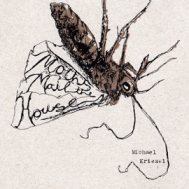Book Review
Moths Mail the House by Michael Kriesel. Buffalo, NY: sunnyoutside press, 2008. $10.
Reviewed by Erik Richardson
Michael Kriesel’s Moths Mail the House, from sunnyoutside (Buffalo, 2008) captures a gritty, stark feeling that is haunted around the edges, and calls to mind the mood of Tennessee Williams or David Mamet. The 19 poems in this 12.5 cm x 12.5 cm text range from childhood at the hands of an alcoholic father to scenes of nature to lost love, creating a loose narrative of the thematic “self” as he seems to be slowly becoming his father.
The poems in this collection are made of very short lines of 1-3 words with the lines arranged into rows (usually 3-4) and columns (also usually 3 or 4). In a number of the poems, this form was used to interesting effect and brought an added dimension to the interpretive imagery. A particularly good example of this is seen in Clots, which begins:
Light clots oaks drop confetti
Time moves . . .
The woods
Where we see the effects brought to life by achieving two different poems, and yet, at the same time, some poems used the format without adding anything new to the poem—thereby neutral, and others, though having the same arrangement actually worked against the imagery and the reader. An example of such neutrality is found in:
Birches rise like snow
rise like skinny . . .
like skinny
snow . . .
And an example of the form working against the reader is:
What we’re In my life Strawberries
not you’re one . . .
counts . . .
too
Attempting to make sense of a phrase like, “What we’re in my life strawberries not you’re one . . .” is frustrating and pushes us past evocative surrealism to a kind of empty randomness. Naturally, the author may have been looking to discomfort us, but I found the effect to be somewhat distracting. While tinkering with the words to see if they were operating in two directions, I was held back from engaging the often rich imagery of the poems.
At the same, time, however, I did want to engage the imagery. There were some strong and vivid ideas, and they make it a text worth spending some time with. The thought of the storyteller’s dad as he “wrestles the devil in the bathroom mirror” stands out as both dark and evocative. Another powerful image that lies near the thematic heart of the text is, “Card trick done with colored leaves suddenly I’m forty.”
While the overall tone of poems is dark and tinged with heartbreak, Kriesel punctuates the mood from time to time with a lighter note, as when we see strangers in their underwear linked together in a chain by a changing room mirror. Probably my favorite image from the whole group, though, is that of poems playing chess by mail against God.
The primary tension created in the collection is between love and loss, and the author manages to do this without falling into cliché. But even more than this tension, what helps to contribute a sharp edge to the text is that the details of the scenery are often reminiscent of writers like Dickey or Dillard, in which nature is a place of blood and death and struggle: A bear bleeding out in the snow, the hoarseness of crows, swarming moths covering up the windows. And yet, in contrast to a desolate backdrop—as we see when, “I shout snow’s emptiness no echo”—we also see a touch of the sacred, as when, “birds bless ditches roads” and birch trees, “rise like skinny souls.”
Overall, it is a text well worth reading. It is not a slow or filling evening meal; it is more like a shot of tequila that gives you a quick bite to the throat with a strong aftertaste.
Erik Richardson is a schoolteacher and freelance writer in Milwaukee. Recent work has appeared in Arbor Vitae, Sein und Werden, and Wisconsin People & Ideas (forthcoming). He won the 2009 Gahagan Prize in poetry and publishes a modest poetry journal for young people: Signs & Wonders.


